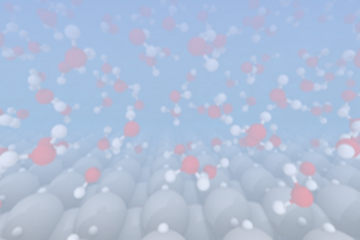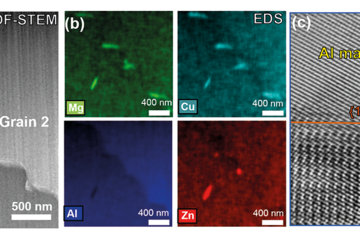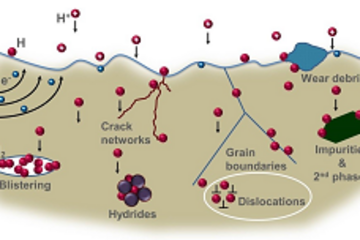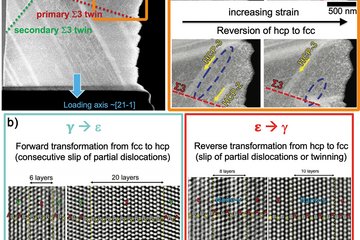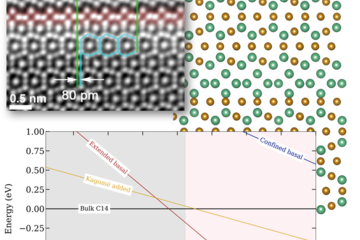All genres
441.
Talk
Scanning Kelvin Probe Force Microscopy (SKPFM) – Nanoskopische Aspekte der Korrosion. 4. Workshop Rasterkraftmikroskopie in der Werkstoffwissenschaft, Westfälische Wilhelms-Universität in Münster, Münster, Germany (2004)
442.
Talk
Surface Modification of Iron based Alloys for Improved Corrosion Resistance and Adhesion. 13th Asian Pacific Corrosion Control Conference, Corrosion Symposium in NIMS, Tsukuba, Japan (2003)
443.
Talk
Novel Zinc Alloy Coatings: Tailored Semiconducting Oxides for Improved Corrosion Protection and Adhesion of Organic Coatings. 13th Asian Pacific Corrosion Control Conference, plenary lecture, Osaka, Japan (2003)
444.
Talk
Scanning Kelvin Probe Force Microscopy, a Useful Tool for Studying Atmospheric Corrosion. 204th Meeting, Orlando, FL, USA (2003)
445.
Talk
Delaminationsschutz mit neuartigen Zinklegierungsschichten. API-Tagung, API-Preisvortrag, "Die Lackindustrie auf dem Wege zur sanften Chemie?", Rostock-Warnemünde, Germany (2003)
446.
Talk
Molecular Scale Aspects of Cathodic Delamination. Electrochem 2003, 44th Corrosion Symposium, Southampton, UK (2003)
447.
Talk
Fundamental Aspects of Delamination. Corrosion Science in the 21st Century, UMIST, Manchester, UK (2003)
448.
Talk
Delamination of Polymer Coatings from Metal Substrates: Submicroscopic and Molecular Aspects. MRS Fall Meeting, Boston, MA, USA (2002)
449.
Talk
The Effect of the Electrode Potential on Molecular Self-Assembly. Symposium on "Nano-scale materials and self assembling structures", Cykl sympozjów naukowych i imprez kulturalnych", Science and Art in Europe, Warsaw, Poland (2002)
450.
Talk
Atomic and Molecular Order at Surfaces and Buried Interfaces and its Effect on Chemical and Mechanical Stability. MPG-UCSB Workshop on “Nanostructured and Functional Materials”, Naurod, Germany (2002)
451.
Talk
Study of electrochemical behaviour of MgZn2 with respect to its effect on the corrosion of Mg-containing zinc coatings on steel. ISE 2002, Düsseldorf, Germany (2002)
452.
Talk
Microscopic Aspects of Delamination. Materials Week, München, Germany (2002)
453.
Talk
High Resolution Studies of Delamination with SKPFM. NH Gordon Conference on Aqueous Corrosion, New London, NH, USA (2002)
454.
Talk
Microscopic and Submicroscopic Aspects of Delamination. 5. Workshop “Nanometerschutzschichten: Untersuchung der Grenzfläche Schicht-Struktur”, Nanotechnologie-Kompetenzzentrum „Ultradünne funktionale Schichten“, Braunschweig, Germany (2002)
455.
Talk
From Molecular Aspects of Delamination to New Polymeric Coatings. XXVI FATIPEC CONGRESS, Dresden, Germany (2002)
456.
Talk
Surface Modification of Al-based alloys by phosphonates for improved corrosion resistance and adhesion. LMSS/SINTEF 2001 Adhesion Seminar, Stjørdal, Norway (2001)
457.
Talk
Self-Assembly From Solution And Under Electrochemical Control Compared to Monolayer Growth By Vapor Phase Deposition. MRS Fall Meeting 2001, Boston, MA, USA (2001)
458.
Talk
Microscopic and Submicroscopic Aspects of Delamination. ECASIA 2001, Avignon, France (2001)
459.
Talk
Investigation of the delamination of polymer-coated zinc and steel surfaces with the scanning Kelvin probe in a climatic cycle test. GALVATECH 2001, Brussels, Belgium (2001)
460.
Talk
The Scanning Kelvinprobe - A New Technique to Study the Stability of Metal/Polymer Bonds. Second International Symposium on Adhesion Aspects of Polymeric Coatings, Newark, NJ, USA (2000)




